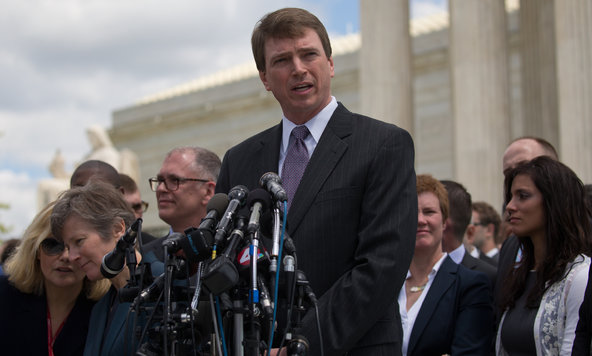One of the two attorneys who successfully argued that state bans on same-sex marriages were unconstitutional in Obergefell v. Hodges spoke at the Law School on Wednesday.
Doug Hallward-Driemeier began his discussion by saying the Obergefell v. Hodges case rested on two questions: 1) are states required to license marriages between two people of the same sex? and 2) are states required to recognize marriages of same-sex couples licensed out-of-state?
Mary Bonauto argued Question 1 for the plaintiffs; Hallward-Driemeier argued Question 2.
The plaintiffs were concerned the Court would issue a partial victory, ruling “yes” on Question 1, but “no” on Question 2.
Hallward-Driemeier said they didn’t want a partial victory.
“Those who were involved in this movement were not looking for a patchwork across the country of marriage equality. They wanted marriage equality to be uniform,” he said.
Hallward-Driemeier said his goal was to reinforce Mary Bonauto’s Question 1 argument while he argued Question 2.
“One of the real hopes of [my] preparation was making sure the second issue did not become an off-ramp,” he said.
Hallward-Driemeier said he tried to convince the Supreme Court that ruling “no” on Question 1 and “yes” on Question 2 would establish same-sex marriages as second-class marriages, which would have some constitutional protection but not the same level of protection as heterosexual marriages. The Supreme Court decided in favor of the plaintiffs on both questions.
Equal protection cases are analyzed under three types of scrutiny: strict, intermediate, and rational basis. Historically, sexual orientation discrimination cases are analyzed under rational basis scrutiny, which is extremely lenient, as it only requires government to justify discrimination with a “rational” reason.
Strict scrutiny, the most stringent level of scrutiny, which requires government to prove discrimination, is “narrowly tailored” to serve a “compelling interest,” is only applied to discrimination of “suspect classifications.” Race, religion, nationality, and alienage are defined as suspect classifications; sexual orientation is not.
“The Court hasn’t recognized a new classification as suspect in many many years, and some question whether it will ever recognize another,” he said.
Hallward-Driemeier said that might change after Obergefell.
“I do think that the pieces are there for lower courts, and maybe for the Supreme Court, eventually, to find that [sexual orientation] is a suspect classification,” he said.
Much of Hallward-Driemeier’s talk was a sophisticated discussion of the case’s legal arguments. However, when arguing that laws against recognizing same-sex marriages discriminate on the basis of not just sexual orientation, but also sex, he provided an extremely simple example.
“Sue loves Bill and Tom loves Bill. Sue can marry Bill, Tom cannot, and it’s only because of the respective genders of Sue and Tom. Why isn’t that gender discrimination? I’m still waiting for the answer to that question,” he said.
Moderator Professor Daniel Hemel asked Hallward-Driemeier about harsh criticism from legal scholars of the Supreme Court’s majority decision, which was written by Justice Kennedy. Hallward-Driemeier called the decision “perfect.”
“It’s the perfect opinion for this movement for this time,” he said.










